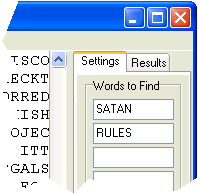In yet another friendly religious debate, I was given the argument that goes something like, “How do you know that _____ _____ existed?” The blanks can obviously be replaced with any prominent historical figure who is no longer living. On this occasion it was George Washington. This argument is quite weak in itself, since it is not even an argument for or against the existence of God (or Jesus); instead, it argues only that human knowledge is fallible, therefore no fact can be absolutely certain, indirectly leaving a little room for the possibility of a god.
The response to this kind of argument is three-fold. First, we have thousands of instances of indirect evidence that supports the existence of George Washington in the form of biographies, paintings, and letters, as well as documents and letters written by the man himself. It’s highly unlikely and unnecessary for all of these sources to have conspired to invent a non-existent first president of the United States.
The second part of the response is perhaps the most important: George Washington never claimed to be able to break the laws of physics! There are no claims of Washington parting seas, curing the blind, or turning water into wine. If such a claim had been made, we would undoubtedly need some truly convincing evidence, like confirmations of the observed phenomena by the greatest scientists of the time (emphasizing their inability to explain the phenomena), as well as experimental data on repeatability and consistency of Washington’s powers.
The third part of the response is a bit more subtle, but also very important. Believing in the existence of George Washington is not integral to the understanding of reality. History is reevaluated all the time. One day, historians might even discover that Washington was a hoax, and never existed as a real person. However, this kind of finding would have no effect on the foundations of physics, cosmology, or biology. The existence of Jesus, however (especially the god-man Jesus of the Bible) would have profound consequences in many scientific disciplines. The fact that the Bible is the only (second-hand) source that attributes supernatural powers to Jesus makes for particularly weak evidence for his divinity. If there was a single manuscript claiming that George Washington had magical powers, I would undoubtedly want evidence that is as credible as the claim is outlandish. Wouldn’t you?
 It works like this: start the program and open the text file that you want to search (the program automatically strips punctuation and whitespace). Then enter up to seven words to look for, and click the Start button! The program will find the first occurrence of all words within a certain range, unless you select “Find All” instead of “Find One.” The result(s) will be shown in the Results tab.
It works like this: start the program and open the text file that you want to search (the program automatically strips punctuation and whitespace). Then enter up to seven words to look for, and click the Start button! The program will find the first occurrence of all words within a certain range, unless you select “Find All” instead of “Find One.” The result(s) will be shown in the Results tab.